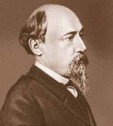Nikolay Nekrasov

Nikolay Alexeyevich Nekrasov (Russian: Никола́й Алексе́евич Некра́сов; IPA: [nʲɪkɐˈlaj ɐlʲɪkˈsʲejɪvʲɪtɕ nʲɪˈkrasəf], December 10 [O.S. November 28] 1821 – 8 January 1878 [O.S. 28 December 1877]) was a Russian poet, writer, critic and publisher, whose deeply compassionate poems about peasant Russia won him Fyodor Dostoyevsky's admiration and made him the hero of liberal and radical circles of Russian intelligentsia, as represented by Vissarion Belinsky and Nikolay Chernyshevsky. He is credited with introducing into Russian poetry ternary meters and the technique of dramatic monologue (V doroge, 1845). As the editor of several literary journals, including Sovremennik, Nekrasov was also singularly successful.
Nikolai A. Nekrasov was born in the town of Nemyriv (now in Vinnytsia Oblast, Ukraine), Podolia Governorate. His father, Alexei Nekrasov, was a descendant from Russian landed Gentry, and an officer in the Imperial Russian Army. His mother was a Polish noblewoman named Aleksandra Zakrzewska, who was from Warsaw and belonged to szlachta.
Young Nekrasov grew up on his father's ancestral estate, Greshnevo, Yaroslavl province, near the Volga River. There, he observed the hard labor of the Volga boatmen, Russian barge haulers. This image of social injustice, so similar to Fyodor Dostoevsky's childhood recollections, was compounded by the behavior of Nekrasov's tyrannical father. His father's early retirement from the army, and his public job as a provincial inspector, caused him much frustration resulting in drunken rages against both his peasants and his wife. Such experiences traumatized the young poet and determined the subject matter of Nekrasov's major poems—a verse portrayal of the plight of the Russian peasants and women.
 čeština
čeština Deutsch
Deutsch français
français magyar
magyar polski
polski русский
русский English
English Azərbaycan
Azərbaycan беларуская
беларуская italiano
italiano ქართული
ქართული қазақ
қазақ Nederlands
Nederlands slovenčina
slovenčina español
español 中文
中文 português
português







